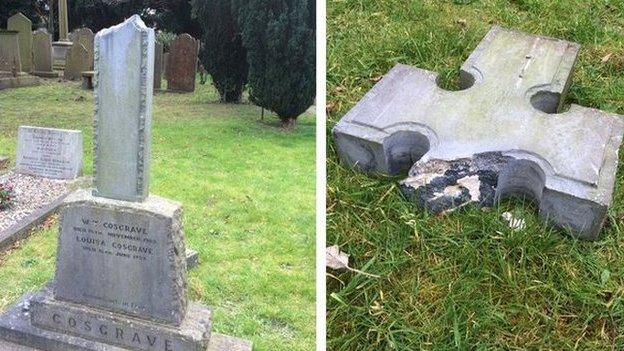WT Cosgrave: Grave of 'first Irish prime minister' damaged in attack
- Published

The politician's headstone has been smashed in an attack at Goldenbridge Cemetery
The grave of the first leader of the Irish Free State has been badly damaged, along with 12 other graves, during an attack at a Dublin cemetery.
William Thomas (WT) Cosgrave served as the first President of the Executive Council - effectively the first Irish prime minister - from 1922 to 1932.
He led the fledgling state through its first tumultuous years after the Irish War of Independence with Britain.
His headstone has been smashed at Goldenbridge Cemetery in Inchicore.
Significant damaged was also caused to the 12 other headstones, which date back to Victorian and pre-Victorian times.
'Motive unclear'
It is not the first time Cosgrave's burial plot has been targeted - his grave was also vandalised in 2014.
Another 12 headstones, which date back to Victorian and pre-Victorian times, were damaged in the attack
The Dubliner came to power during the Irish Civil War, a bitter conflict between those who supported the 1921 Anglo-Irish Treaty and the creation of a Free State, and those who wanted a new republic, completely independent from Britain.
Cosgrave fought for independence in the 1916 Easter Rising rebellion, but he later supported the treaty and fiercely defended the new Free State.
Under his leadership, 77 republican prisoners were executed during the Civil War - many more than the 16 rebels formally executed by the British after the 1916 rebellion.
'Regrettable'
Cosgrave's legacy has divided opinion, with some viewing him as ruthless and others as a strong leader and a principal architect of Irish independence.
He died in 1965 was buried at Goldenbridge Cemetery after a state funeral.
His son, Liam Cosgrave, who also served as prime minister (taoiseach) from 1973 to 1977, visited the grave to see the damage for himself and a family statement said the incident was "regrettable" for all those affected.
The cemetery is maintained by the Glasnevin Trust.
WT Cosgrave 's granddaughter said it was regrettable for her family and the others affected that such damage was done
The chairman of the charity, John Green, said the 2014 attack had coincided with the publication of a biography of Cosgrave which seemed "too much of a coincidence " but he added that the motive for the latest incident was unclear.
He said the charity did not have any evidence to suggest that the damage caused to the Cosgrave plot was politically motivated, despite the centenary of the Easter Rising later this month.
A grave belonging to a child who was killed during the Easter Rising was also targeted in the attack and Mr Green said the trust was viewing it as vandalism.
'Criminal damage'
The chairman said the graveyard has been the focus of serious anti-social behaviour in recent years, and has been used by drug addicts and dealers to hide drugs.
He said there was local opposition to plans to make the cemetery more accessible to the public, with proposed tours and a new entrance.
Mr Green said the trust would be asking the government to assist with the repairs because of the national importance of the Cosgrave plot.
A police spokesman described the attack as "criminal damage" which was reported to officers on Monday 14 March.
"No arrests have been made to date and investigations are ongoing," he added.